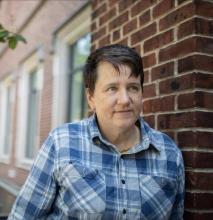Professor Heather Love in OMNIA Feature on Disability Studies
June 14, 2023
The following excerpt is featured in an OMNIA article focused on disability studies. See the full piece here: https://omnia.sas.upenn.edu/story/seeing-disability-differently
Heather Love: Difference
Though minorities can be “hidden from history” in literature, says English Professor Heather Love, disability is everywhere. “Disability is actually very present in the history of literature, but it’s not represented realistically,” she says. “There’s no interest in the social fate of those characters. They’re used primarily as symbols—of evil, or frailty, or purity.”
In spring 2023, Love was awarded a prestigious Guggenheim Fellowship in the category of literary criticism. Her interest in disability studies is related to her work in gender, sexuality, and queer studies.
“Disability studies allows us to recognize that human difference itself has value, rather than being something to be eliminated or managed,” says Love, whose books include Underdogs: Social Deviance and Queer Theory and Literary Studies and Human Flourishing, which she co-edited with James English, John Welsh Centennial Professor of English. “Shifting the frame changes how we make laws, how we educate citizens, how we make decisions about healthcare—all those things.”
It’s a message she tries to impart in her Disability Narratives course, which starts with students reading classic literature that features disabled characters. The texts then turn to memoirs and novels by people with disabilities. “Rather than thinking about this as a tragedy, we really think about it as a difference,” she says. “This material can be really challenging and transformative for students.”
People are often ready to judge other people’s lives as being not worth living or unsustainable, Love says. “But of course, things feel very different from the inside. I think what I try to teach in that class is that we’re unknown to each other in ways that can’t be overcome so easily.”
She struggles to balance the recognition of human variety with being realistic and pragmatic about the struggles people have. The intellectual history of disability studies began with a social model that argued that the world causes disability—for example, not having ramps and other accommodations so that wheelchair users could move freely through the world.
“It’s like the environment itself is disabling because it doesn’t make space for people with physical and other differences,” Love says. “And that’s such an important piece of the movement, and it’s behind many key policies. But there’s a more recent wave of work that argues that we also have to recognize that people deal with pain and impairment.”
In the classroom and her work, she’s able to explore nuances, she says, “but I’m often aware of the tensions between that academic approach and passing laws in Congress or protesting. I think there’s a place for all of these.”
Learn more about Professor Heather Love: https://www.english.upenn.edu/people/heather-k-love
Featuring Heather K. Love

 Department of English
Department of English
